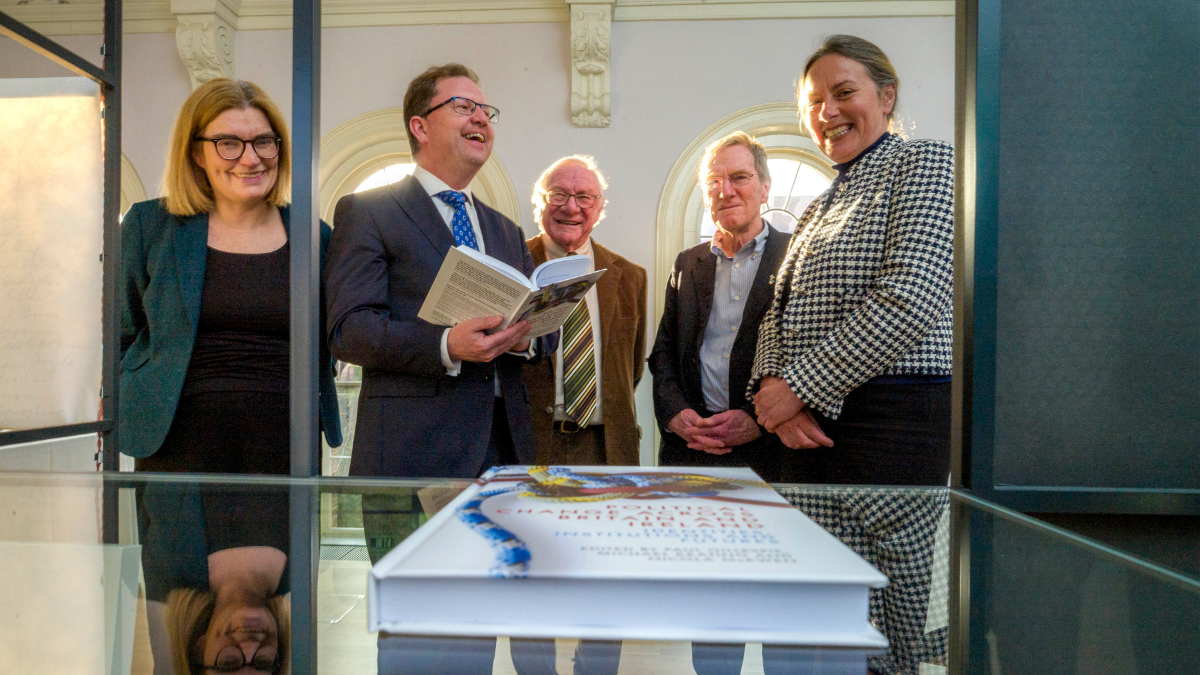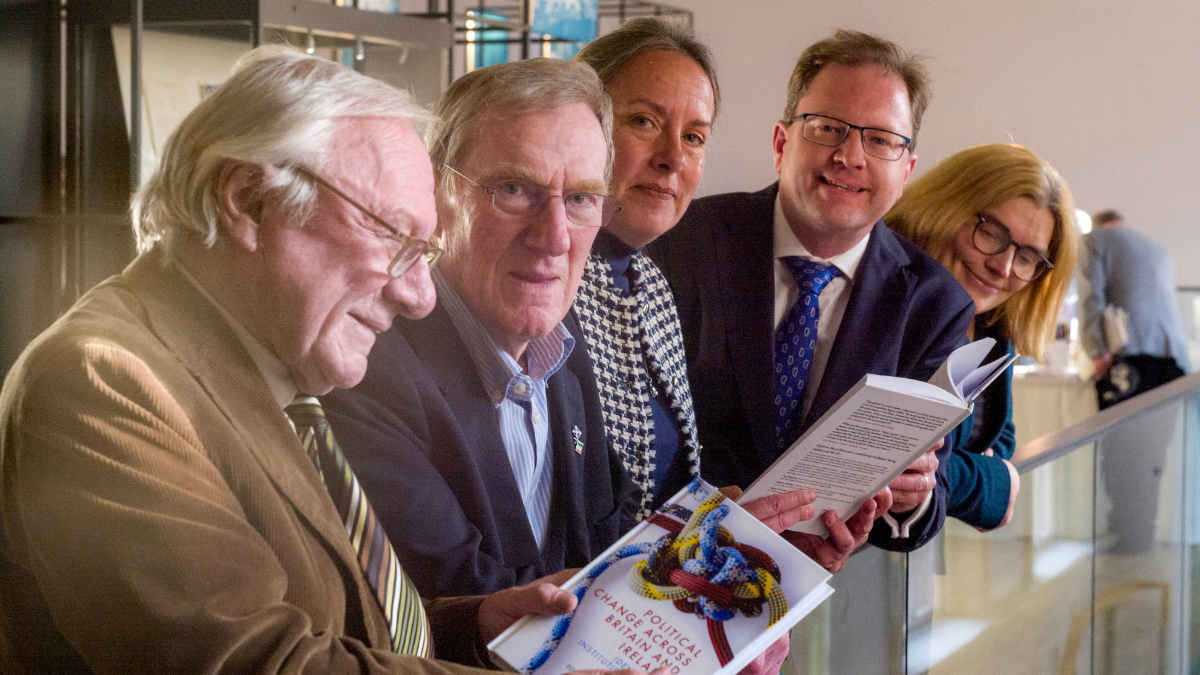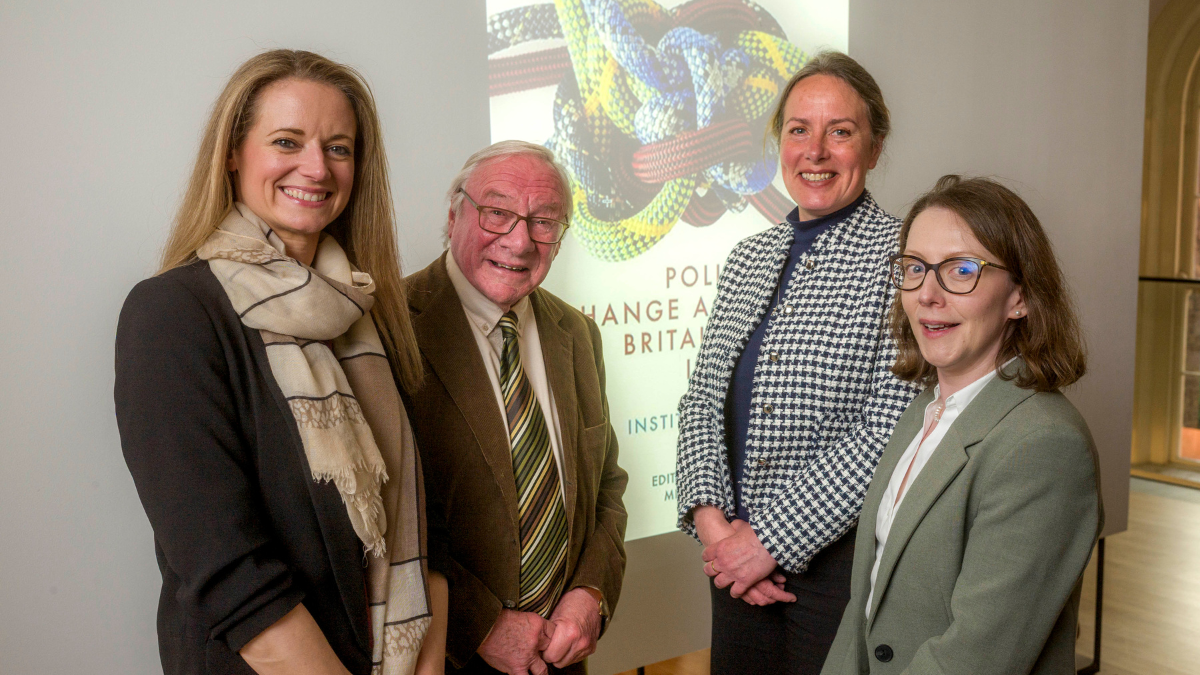
A Newman Fellowship research project examining the political and constitutional implications of Brexit for the UK and Ireland – and the shifting dynamics of the relationship between the two countries – culminated in the 2-day conference Ireland, Britain and Europe: Constitutional Futures after Brexit, which took place on 7 & 8 April in the Museum of Literature Ireland (MoLI).
The Constitutional Futures after Brexit project was launched in 2019 in the Institute for British–Irish Studies (now the Centre for Peace and Conflict Research) in UCD School of Politics and International Relations, and was funded by a strategic partnership with the Reconciliation Fund of the Department of Foreign Affairs, with additional funding from the Joseph Rowntree Charitable Trust and the Irish Research Council’s New Foundations Fund.
The postdoctoral research was spearheaded by three Newman Fellows – Dr Roland Gjoni, Dr Jonathan Evershed and Dr Sarah Wallace – who each brought unique perspectives and experience to their individual projects, overseen by Dr Paul Gillespie.

One important output of the project is the book Political Change across Britain and Ireland, Identities, Institutions and Futures, which was launched at the conference by James Lawless, Minister for Further and Higher Education, Research, Innovation and Science. The book addresses a selection of themes within the framework of identity politics, and encompasses not only the north–south relationship on the island of Ireland but also the east–west aspect of British–Irish relations within the wider European and transatlantic settings.
Dr Paul Gillespie reflects on the significance of the book, which he co-edited with Professor Michael Keating, co-founder of the Centre on Constitutional Change at the University of Edinburgh, and Professor Nicola McEwen, Director of the Centre for Public Policy at the University of Glasgow: “That word ‘across’ in the title – Political Change across Britain and Ireland – is very important: the idea that we’re interlinked in various ways that a lot of the existing state-focused and unitary-state-focused vocabularies don’t properly take into account. Each chapter is co-authored by somebody living in Britain and somebody living in Ireland, and that encourages the cross-thinking, or transversal thinking, that we’re interested in.
“The book presents a selection of themes that suggest new ways of thinking about politics in Britain and Ireland, given the different states involved, the different jurisdictions, and the very tangled history. The image on the front cover is a Gordian knot, which is an appropriate metaphor: it can be untangled by force or by patience.
“We consider the interpenetration of politics in lots of other aspects of life, and identify some of the major driving forces of change. We’re illuminating ways of thinking about the constitutional futures in a way that keeps the interconnections alive, rather than the separations, and that’s important.”

Public attitudes towards Irish unification
Dr Roland Gjoni carried out his Newman Fellowship research in 2021, amidst the restrictions and uncertainty of the Covid pandemic. He had previously completed his PhD in UCD School of Politics and International Relations, exploring the role of the Irish state in Northern Ireland and the role of Albania in the conflict in Kosovo.
“When the Newman Fellowship opportunity came up, I saw that this research programme on constitutional futures after Brexit dovetailed very well with the last chapter of my PhD – on the impact of Brexit on unification scenarios or united Ireland scenarios, and how Brexit will upset and probably even expedite some of the processes that were thought to be settled by the 1998 Good Friday Agreement,” he said.
Roland secured funding from the Joseph Rowntree Charitable Trust to conduct a deliberative study of southern public attitudes towards a united Ireland. He brought together 50 Irish citizens of voting age in an online citizen’s assembly.
“What we found was that, firstly, people want to be fully informed when it comes to discussions about the future of north and south, not to make the mistakes that were made prior to Brexit. Secondly, although material financial impact is on people’s minds, there may be a tendency to underestimate the importance of non-material, symbolic and identity elements – like the changing of the Irish flag, the Irish anthem, the possibility of having a unionist vice-president in Dublin – which can stifle the discussion or become stumbling blocks. For many people in the south, the state established in 1921 under the Anglo-Irish Treaty has worked well and a lot of people see themselves as the beneficiaries of Irish recovery or ascendancy since the 1920s. Having other people coming in to reconstitute the political space – and bringing their flag, their ideas, their symbols – is not something that people in the south are going to easily accept.”
‘Unionist’ and ‘Nationalist’ conceptions of the constitutional future across Britain and Ireland
With a background in political anthropology, Dr Jonathan Evershed did his PhD research in Queen’s University Belfast, exploring the contested identity of Ulster Loyalism during Ireland’s ‘Decade of Centenaries’. His Newman Fellowship research focused on post-Brexit relations between nationalist parties in Ireland, Wales and Scotland – particularly Ireland–Wales relations – and the shared challenges and opportunities they face.
Jonathan engaged key stakeholders on both sides of the Irish Sea, including in Welsh government, and built a solid foundation for new collegial and productive relations between Ireland and Wales. Following his Newman Fellowship he was appointed to the role of Special Advisor on Policy and Research to the Plaid Cymru Senedd Group.
“The conversation about political and constitutional change across our islands remains dynamic, fluid and more resonant than perhaps it has ever been – this as we all confront new global ecological, geopolitical and strategic challenges.”
“The Fellowship gave me the grounding I need to craft Plaid’s contribution to the Independent Commission on the Constitutional Future of Wales, where support for Welsh independence is higher now than it has ever been. The constitutional status quo does not, and never has served the interests of the people of Wales, nor of the vast majority of those of us who share these islands and call them home.”
Young unionists’ attitudes to unionism
Dr Sarah Wallace took up her Newman Fellowship after completing her PhD in Trinity College. Her doctoral research examined attitudes to power-sharing among the Good Friday Agreement generation in Northern Ireland, and she decided to carry this focus on young people through to her Newman Fellowship.
“The remit initially was very broad – it was unionist perspectives – and of course there’s such a wide, diverse range of unionism within Northern Ireland. We realised that we needed to make it more nuanced, given the timeframe of the project. I thought this was a great opportunity to bring the voices of young unionists to the fore and to gain an understanding of how they view the union, especially because they are often not included in this conversation,” Sarah explained. She also interviewed senior unionists, academic experts and political commentators to capture a range of authoritative opinions.
Interestingly, what emerged from Sarah’s research echoed Roland’s findings from voters in the Republic: the importance of cultural identity and emotional attachment to cultural symbols.
“I was impressed with how much the young unionists had to say on the topic, and how passionate they were about it,” she said. “I think the most significant finding was the importance placed on the emotional aspect of the constitutional question, and that sense of identity, as opposed to economic arguments. There’s a whole different argument there about identity and culture, emotional attachment to their Britishness and the union. It wasn’t about job opportunities or accommodation or healthcare, but rather – this is who I am; it’s my culture.”

UCD Newman Fellowship Programme
The UCD Newman Fellowship Programme supports ambitious research across the sciences and humanities. These prestigious postdoctoral fellowships are made possible through funding received from grants and donations, and the commitment of inspirational academic mentors who are dedicated to pushing the frontiers of knowledge in their chosen discipline.
“The Newman Fellowship was a great bridge-builder between my PhD and the postdoc era. It was a very good opportunity to develop my thinking on constitutional futures across these islands and a stepping stone to my current role with the Council of Europe, working on constitutional reforms, justice and international cooperation.” Dr Roland Gjoni
“My time as a Newman Fellow will forever be part of an important personal, intellectual and political journey, and it is hard to imagine that my life would have taken the course that it has without it.” Dr Jonathan Evershed
“I loved my Newman Fellowship experience. There was a really good balance between having the freedom to carry out the research as I saw fit, and knowing I had the full trust and support of my supervisor. Having that trust gave me a real sense of pride and confidence. The networking opportunities I’ve had during my Fellowship have been brilliant. It’s opened so many doors to meet people.” Dr Sarah Wallace
